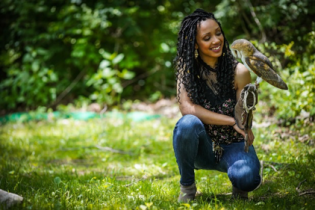Graduate student reflects on why she chose Georgia Southern
 Corina Newsome is a student pursuing a Master of Science in biology. She spent her undergraduate years as a zoo and wildlife biology major at Malone University in Canton, Ohio.
Corina Newsome is a student pursuing a Master of Science in biology. She spent her undergraduate years as a zoo and wildlife biology major at Malone University in Canton, Ohio.
Q: What drew you to Georgia Southern for your graduate studies?
A: Well that’s an interesting story! Since my junior year of college, I have been obsessed with birds. After working with them professionally for several years, I decided I wanted to continue my education. Two years ago, a film crew came to my job at the time, Nashville Zoo, to film with me for a documentary on Christian faith and environmental stewardship. I got to chatting with one of the videographers about my love for birds, and he ended up telling me one of his good friends in Statesboro, Georgia, Steve Hein, was a falconer. I was ecstatic. He connected us right away, and within a couple of months I was driving down to Statesboro to go falconing. When I arrived, I immediately realized that I had seen this school mentioned on a database for graduate advisors in ornithology, so with 15 minutes to spare on the evening I arrived, I ran to Dr. Ray Chandler’s office. He listened to my three-minute elevator pitch and was gracious enough to submit my information to the Department of Biology to be considered for admission. The rest is history!
Q: What is one thing you are most proud of during your time at Georgia Southern?
A: I am proud of the diverse perspectives that are represented in the biology department at this institution. Much of the science community in the United States has been fairly homogenous, demographically speaking, for a long time. I know from experience that the science community thrives when more diverse perspectives are represented in its ranks, especially when it comes to interfacing with our diverse general public. I have seen more women, students of color, and students from other countries represented in the student body here at Georgia Southern than I have ever experienced, and for that I am grateful.
I am also extremely proud of the Wildlife Center that we have on grounds. When I visited Steve Hein for the hunting trip I mentioned above, I had the opportunity to tour the center. I cried with amazement multiple times. When I walked in and saw several African American students on the animal care and education team, I was blown away. As a former zookeeper, I have witnessed the lack of ethnic diversity in the field of animal care, so seeing a different narrative here was so encouraging. Then, when I toured the facilities and experienced how immediately immersed you become in our natural landscapes and ecosystems, I was speechless. It offers a phenomenal educational opportunity for anyone who comes. I wish more students would check it out!
Q: Are you a part of any research projects? If so, what are you doing?
A: Yes. I am currently completing my master’s thesis. My research focuses on a marsh-dwelling bird called the Seaside Sparrow, which inhabits the coastal marshes of Georgia, Florida and South Carolina. I’ll be focusing on the Georgia populations. I’m assessing the occurrence of nest-predators of Seaside Sparrows, such as raccoons, mink and rice rats, along several habitat gradients and determining whether the density of predators in an area corresponds to the frequency of nest predation.
This will require me to set up several kinds of monitoring equipment in the marsh, such as camera traps and video recorders. The marshes in which I’ll carry out this project are tidal. The water can increase in height by approximately five to seven feet twice a day, so all of that equipment has to be waterproof or able to float!
Q: How is Georgia Southern preparing you for your future career?
A: Georgia Southern has already significantly strengthened my skills in data analysis and research design. I was also paired with a phenomenal advisor, Elizabeth Hunter, Ph.D., who is not only a joy to be around, but is an incredibly skilled leader and mentor. So, in addition to learning practical skills that will be necessary for my future profession, I am learning how to lead.
Newsome has since received her first research grant, which was provided by the Georgia Ornithological Society. These funds will provide the necessary equipment for carrying out her research project over the next two summers.
Georgia Southern University, a public Carnegie Doctoral/R2 institution founded in 1906, offers 141 degree programs serving nearly 26,500 students through nine colleges on three campuses in Statesboro, Savannah, Hinesville and online instruction. A leader in higher education in southeast Georgia, the University provides a diverse student population with expert faculty, world-class scholarship and hands-on learning opportunities. Georgia Southern creates lifelong learners who serve as responsible scholars, leaders and stewards in their communities. Visit GeorgiaSouthern.edu.
Posted in Press Releases

